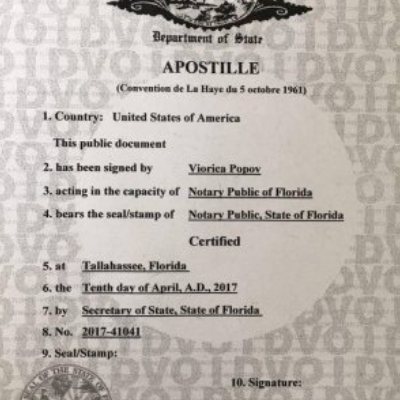
Birth Certificate is the first official document in human life. Birth certificate translation has to be competent from the point of legal terms, has to eliminate typos. As a rule, the birth certificate contains the information on the full name, the date of birth, the birthplace. Also it can include the full name (names) of his or her parent (parents), their address and the occupation at the time of registration. Other accompanying official details can contain the name of hospital where the child was born, the name and the signature of the doctor and the number in the registration book. Birth certificate translation is termless.
The Cases when Birth Certificate Translation is required
Birth Certificate Translation on a foreign language can be required for Foreign Embassy, Department of the Migration of Citizens, offices of Federal Migration Service. Also the translation will be required in case of moving abroad and obtaining foreign nationality, registration of marriage with the person having foreign nationality, registration for work in foreign firm, training abroad, other cases provided by the legislation. In a reverse situation the translation of foreign documentation into Russian will be required.
Notarized Birth Certificate Translation
For competent and relevant translation it is necessary to specify at the custiomer what instance demands the translation. In most cases the subsequent notarial assurance (checking and assuring the authenticity) of the translator’s signature is required. If the document contains an apostille, then it is important to know whether its translation is necessary. At last, in certain cases the translation of the text of stamps on the document is required.
For the implementation of the translation according to notarization standards, it is necessary to translate precisely the structure of the text, eliminate mistakes and typos in proper names, names of institutions, addresses, figures. Number of the certificate can't be translated into a foreign language because of the possibility of identification.
Translation of the certificate by the professional translator and the subsequent assurance at the notary is legally allowed. However, for this purpose, it is necessary to observe all formal requirements of the notarized translation: to specify a translation direction, to enter the text of the assuring inscription, to specify the translator’s data and to put down the signature by hand.
Apostilization, Birth Certificate Apostille Translation
The apostille represents either separately issued page, or a stamp on the translation of the birth certificate, which confirms authenticity and validity of the certified documentation. The apostille is an integral part of the birth certificate translation; it has registration number and is formed according to state standards of the Hague Convention Participants.
Before the birth certificate translation it is necessary to specify whether the procedure of apostilization is required and also whether the translation of the apostille into a foreign language is necessary. In case of need, the translation of the text of the certificate and the text of the apostille should be carried out simultaneously; after that all documentation in general should be notarially certified. If the notarized translation has been already done, but apostilization is carried out after assurance, it is necessary to translate an apostille separately and to certify the translation again.
Requirements to the Translator
The translation of the birth certificate and the related documentation has to be carried out only by certified specialists in the field of law. The professional knowledge of the legislation, legal terms, features and requirements of institutions, for which the translation is intended, is required. Otherwise, the translation is considered illegal. The translation has to be guided by standards for professional translators ISO 17100 and European standard EN 15038.
The Advantages of the TranslatorsAuction Internet-platform
The website TranslatorsAuction.com represents more than the translators exchange on a competitive basis. It provides the unique opportunity to conduct the ruled auction: preliminary testing, cross assessment by potential authors the works of the other applicants, ranging the results of the tests according to the points gained by "blind" assessment. The conditions allow the customer to choose the option, which is the most suitable for his requirements in compliance with the ratio suggested price – points of the general rating.
Detailed information about a possibility of the choice of the translator and the publication of the order you can read on pages «How to Choose the Translator» and «How to Place the Order».
